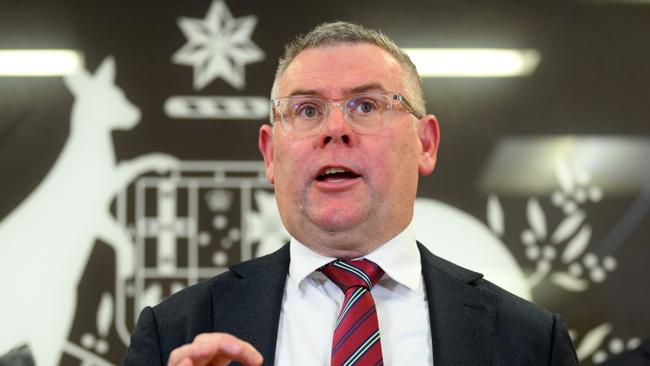Federal budget: Biosecurity set to be a winner but importers and exporters face fee hike
A predicted federal budget funding boost should deliver Australian agriculture a long-awaited sustainable biosecurity funding model.
EXCLUSIVE
The Albanese government appears set to introduce a watershed sustainable biosecurity funding model for the Department of Agriculture in next Tuesday’s federal budget.
It is understood that months of lobbying Treasury by Agriculture Minister Murray Watt has paid off, with speculation mounting that a $200 million a year increase has been secured for the department’s bottom line.
The news will be welcomed by a now $90 billion agriculture industry that has pushed for sustainable and secure biosecurity funding for several years.
But the trade-off is that importers and farmers can also expect increased fees and charges attached to the cost of importing goods and exporting products from Australia to overseas markets.

Under a “shared responsibility” model, importers and farmers are key beneficiaries of the nation’s world-class biosecurity network. Agriculture also trades on Australia’s relatively disease-free status.
Australia’s biosecurity system is under siege with a growing demand on services, increased travellers and screenings, a surge in contaminated materials coming into Australia requiring inspection, and an increased frequency and multiplicity of biosecurity threats in the region, including foot and mouth and lumpy skin disease.
Mr Watt had promised to deliver a sustainable biosecurity model since his appointment.
The extra funding is understood to be a mix of government cash and cost-recovery.
The federal budget currently contributes about $600 million a year towards biosecurity. That could rise to at least $800 million a year with the new funding.
Last week, Mr Watt said the government was working on “making sure that we can deliver sustainable biosecurity funding”.

“This is something that has never happened in our country,” he said.
“So, we need to make sure that we move towards permanent, dedicated funding for biosecurity rather than top-up measures year to year, which is what we’ve seen in years gone by.
“Biosecurity is a shared responsibility and so is funding it, so we need to make sure that taxpayers are putting in our share through the government.
“But we also need to make sure that risk creators, like importers, are paying their share and also the beneficiaries of the system pay their share as well because it’s in all of our interests to keep agriculture safe and have a strong biosecurity system.”
The extra funding will likely help plug some gaps that the department’s existing budget cannot fill - such as increased permanent staff and digitisation and other technological improvements - and increased and enhanced border security measures.
The agriculture department has been forced to cut spending and fired contractors after it was recently revealed its books are so deep in the red that it will record a $60 million cost recovery shortfall this year.




